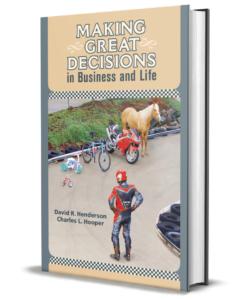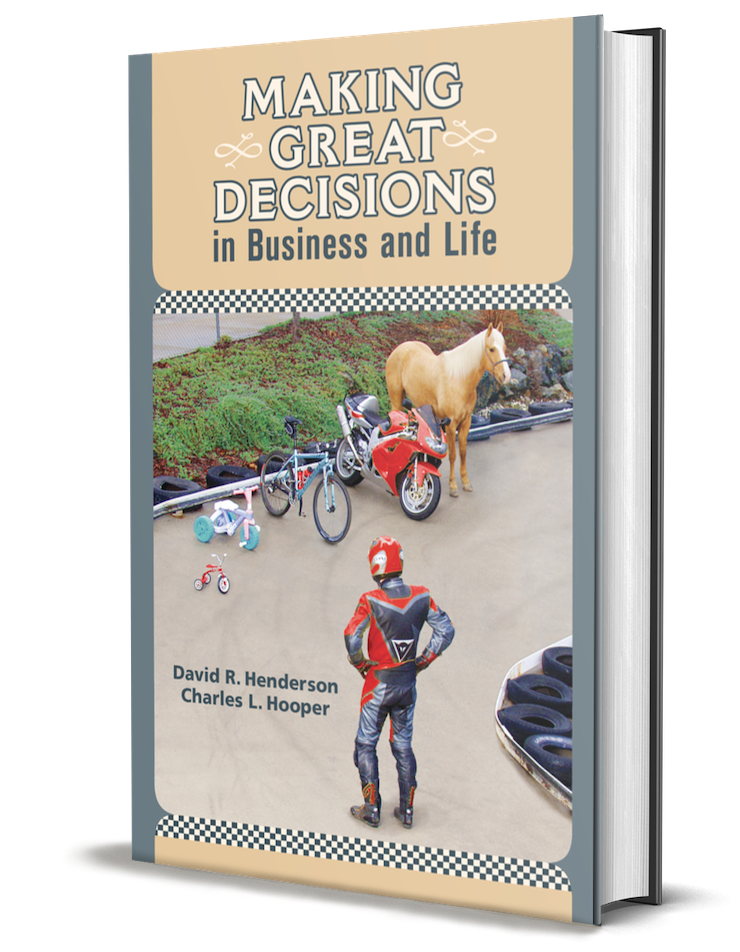
More evidence that thinking through basic economic concepts can help you make better decisions.
Last week, my wife asked me to pick up some prescriptions from the CVS Pharmacy that’s on my way home from work. I forgot. When I got home, she reminded me. I turned around and drove to CVS, a drive that takes about 6 minutes. (You’ll see why this matters anon.)
When I got there, I called my wife, Rena, to tell her that there were at least 9 people in line in front of me and so if she was hungry, she should go ahead and eat without me. She told me I should come home and try again when it was less busy. I said no because it would take no longer now than it would for a future trip.
Here’s the key fact. There were two sunk costs here: my 6 minutes in getting to CVS and my 6 minutes to get home. How was the 6 minutes to get home sunk even though I hadn’t borne it yet? Because I didn’t plan to stay overnight at CVS.
That means that there was a sunk cost of 12 minutes.
If I were to go home, I would need to go there some other time. Let’s say I chose a time when there was no line. (That has NEVER happened, by the way.) So then the time cost of getting to the front of the line is 12 minutes.
So the right comparison to make is the 12 minutes some other time with the X minutes I expected to be in line that evening. Eyeballing it, I estimated that X would be about 15 minutes. That would mean that I would save at most 3 minutes by going home and coming at a different time. So I decided to stay.
As it turned out, my time in line was about 18 minutes. So I lost at most 6 minutes by staying.
I think I made a good decision. Remember that it was extremely likely that if I went at any other time, there would be some line and, therefore, some extra minutes.
You could counter that if I went to CVS the next day on the way home from work, I would not bear a cost of 12 minutes. It would be more like 3: 2 to turn off the main road and find a parking space and 1 to get back on the main road. True. And relevant if I had a good memory. But there was a good chance that I would forget the next day too. Also, the odds would be that I was coming home at around 5:00, which is when the biggest lines appear.
This analysis, by the way, is much like a similar analysis of sunk costs that Charley Hooper and I did in Making Great Decisions in Business and Life.
Here’s that passage, from page 45:
About 15 years ago, I (DRH) was visiting an economist friend and helping him work on his house. He decided to get some weather stripping for a window, and so we hopped into his car and went to the local hardware store. He found what he wanted, but was disappointed that the price was $10 rather than the $6 he expected. Our conversation went like this:
Jack: Let’s go. I’m not willing to pay $10. I’ll find another hardware store some other time.
David: Wait a minute, Jack. This makes no sense. You showed by your behavior that the weather stripping was worth at least $10 to you.
Jack: How?
David: You got in your car and drove ten minutes to the hardware store, which makes the round trip 20 minutes. If your time is worth at least $12 an hour, and I’m sure it is, then you bore $4 in time costs to make the round trip to the hardware store. So that $4 in time that you were willing to pay, plus the $6 in out-of-pocket expenditure you were willing to pay, adds up to $10, the price they’re charging. Now that you’re here at the hardware store, the cost of getting here is sunk, and the cost of getting back to your house is sunk unless you plan to live in the hardware store. So you should ignore those costs and buy the weather stripping.
Jack agreed with my analysis but refused to buy the weather stripping, even though he later had to make another trip and incur yet another $4 travel expense. The only way that he wouldn’t have had to pay at least $10 would have been to wait until he was running other errands and just happened to pass by the hardware store that sold the weather stripping for $6.


READER COMMENTS
Mark Barbieri
Jan 19 2023 at 9:45am
I read the book a couple of years ago and have recommended it highly to many people.
MarkW
Jan 19 2023 at 1:44pm
It sounds like your friend Jack may have been engaged in altruistic punishment rather than failing to properly value his time. People will go to unjustifiable lengths to avoid being ‘ripped off’. I’m not sure whether this is a good thing or not.
This also reminds me of a friend Steve who told me of a conversation he had with his other friend Ken.
Ken: You should really check out this deal web site — if you keep checking, you’ll see some amazing deals there.
Steve: Oh, I don’t need to waste my time doing that. I have a $500 a year service that gets me the best deal on everything automatically regardless of where I buy it from.
Ken: Wow, that’s cool, how do you sign up?
Steve: That’s the beauty of it, Ken, it’s a virtual service. You don’t have to sign up — you’re automatically enrolled without doing anything. Just buy whatever you want from the most convenient place.
David R Henderson
Jan 19 2023 at 5:40pm
Great story.
Floccina
Jan 19 2023 at 4:49pm
I often have to remind myself that it costs about $0.50/mile to drive and that my time is worth at least $30/hour.
MarkW
Jan 20 2023 at 9:13am
That’s a little tricky, though, depending on how you think about your time. Is a trip to the store 100% drudgery that you’d prefer to avoid? Or is is it sometimes a welcome outing? And then if you start applying your hourly rate to activities, where do you stop? Do you start think how much it’s costing you to take time for this or that?
Colin Sane
Jan 20 2023 at 4:28pm
i’ve never met anyone who really acts as though each leisure hour had a fixed value. not only what you said, but also most people can’t really scale their work hours the way this idea implies.
but the idea is halfway there: by choosing to spend 1 hour doing some chore, you’ve implicitly chosen to not spend that hour engaged in something else: your favorite hobby, entertainment, social event, etc. now it’s just a preference tradeoff, a thing we’re more accustomed to evaluating (“do i buy the tastier jam, or the cheaper jam?”). just consider “what would i realistically be doing right now if this chore didn’t exist”, and the strength of your preference to engage in that other thing gives a more reliable price to put on anything that helps speed up the chore; it’s more immune to the problems you highlight.
David Seltzer
Jan 19 2023 at 4:59pm
David, does CVS have a delivery service that would have saved you time in line and traveling? I see little or no cost other than you or your wife’s opportunity cost while either or both of you are waiting at home. Our local CVS delivers prescription as soon as one hour.
David R Henderson
Jan 19 2023 at 5:41pm
Actually I think it does. I forgot about that. Thanks.
Joy Schwabach
Jan 20 2023 at 6:09pm
CVS Pharmacy offers free delivery if you join their “Care Pass” program. If you pay the yearly rate, it’s $45 (otherwise it’s $60, I think). Anyway, you get a $10 coupon each month as well. I go in and try to spend exactly $10 on something I needed anyway. I don’t use the free delivery on pharmacy items because I have no prescriptions, but if I did, it’s only half a block away.
Grand Rapids Mike
Jan 20 2023 at 4:23pm
Your book is very good, should be required for any econ major or part of an applied econ course. Anyways my experience while similar has a slightly different take. Went to Walgreens to pick up meds, but line was long, it seemed that those picking up something inside the store were having extended conversations with the pharmacist. So I left and went in my car and went thru the med pharmacy pickup window. The pickup was much quicker, no long discussions since just people wanting to pick up the meds. So my time cost was reduced with only other additional cost was gas usage while car idled in the drive thru lane. Think this decision was in a sense an application of one the ideas presented in the book.
John hare
Jan 20 2023 at 5:39pm
It didn’t occur to me until this afternoon that I make similar decisions for a different reason. It’s easier on the mind when not trying to squeeze every drop from every situation. Stress is a killer and reducing it gets a higher life quality too.
Nick Ronalds
Jan 20 2023 at 7:35pm
I have had similar experiences and though I’ve had enough exposure to economics to remember the sunk costs and opportunity costs of my time, I’m still annoyed with myself for forgetting the item in the first place. Now I’m an aggressive user of alarms on my iphone. I set them as far in advance as I want. It works pretty well.
Scott
Jan 21 2023 at 8:48pm
David, did you friend Jack also consider the added value by purchasing the weather stripping now vs later (lower electricity bill and piece of mind that the task is now complete)? Additionally, there is a future opportunity cost in by having to do this again later later vs something more enjoyable, such as reading your book!
Comments are closed.